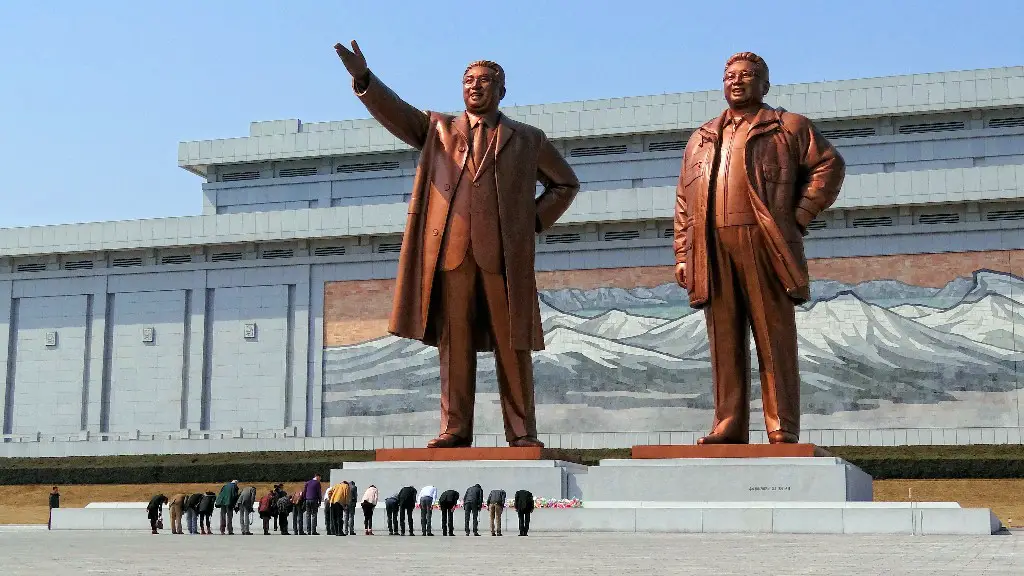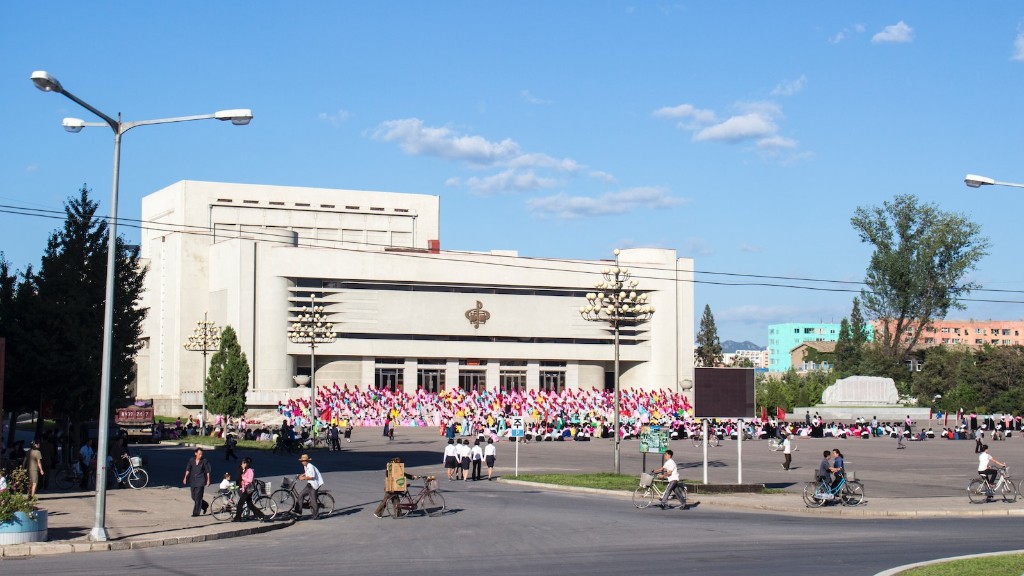How It Could Unsettle The Global Power Balance
It is no secret that North Korea has been a threat to global stability for decades, and it has been suggested by some that a preemptive attack against the nation is warranted. This idea is predicated on several assumptions, namely that such an attack would be relatively successful and that the benefits of doing so would outweigh any potential costs. To get a fuller understanding of why such a strategy would be detrimental, it is important to explore the implications this could have on the global power balance.
The power of North Korea must not be underestimated. It has developed nuclear weapons and missiles, which could potentially reach anywhere in the world if launched. It also possesses a vast array of conventional weaponry, which would be a formidable force should conflict arise. Any attack against North Korea would therefore present huge risks, not least the potential for nuclear war.
The reaction of North Korea’s key allies is also likely to be significant. China is North Korea’s closest trading partner and has consistently stood as an advocate for the regime. Should North Korea come under attack, China is likely to provide military support, which could potentially lead to an escalation of the conflict. Similarly, Russia has historical ties to the North Korean regime and could also provide military reinforcement in order to protect its ally.
Furthermore, such a move could have far-reaching diplomatic consequences. The United Nations, the European Union, and other international organisations might respond with condemnation and could attempt to impose trade restrictions on the aggressor. This could set a dangerous precedent and shake up the global power balance, as other nations may feel emboldened to implement similar strategies in the future.
The economic implications must also be taken into consideration. North Korea’s economy is heavily dependent on exports, and any attack could disrupt this source of income. This could be especially damaging for the global economy, particularly if North Korea is unable to resolve the crisis and rebuild its export markets.
Despite the potential risks of a preemptive attack on North Korea, it is important to remember that there are alternatives. Years of international diplomacy have proven successful in preventing conflict with the nation, and further international initiatives such as sanctions or economic incentives could be used to ensure that the situation is kept under control. Ultimately, a quick and decisive response must be taken to ensure that peace and stability are maintained in the long term.
The Impact On Human Rights
When deciding whether or not to attack North Korea, the people affected by such an action must be taken into account. North Korea has been described as one of the world’s most oppressive regimes, with widespread human rights abuses being committed against its citizens. Any attack, whether initiated by North Korea or another nation, would almost certainly result in harm to innocent civilians.
At present, the international community has largely focused its efforts on providing aid to vulnerable North Korean civilians. This includes multinational organisations such as the United Nations and World Food Programme, which provide humanitarian assistance, as well as non-governmental organisations which provide access to education and healthcare. Military intervention, however, would disrupt much of this aid and could potentially lead to a humanitarian crisis.
Furthermore, an attack on North Korea would represent a major setback for human rights reform in the nation. North Korea has recently come under increased international pressure to improve the human rights situation within the country, and any conflict may render these efforts meaningless. This could prove to be particularly damaging for the civilians who rely on organisations such as the United Nations for their safety.
Ultimately, if an attack on North Korea is to be pursued, it must be done in such a way as to minimise the risk to civilians. This may require the implementation of specific strategies or the use of certain technologies, such as precision weapons, which can accurately target military objectives while minimising collateral harm.
The Human Cost: The Impact on Soldiers
When assessing the possible impacts of a preemptive attack on North Korea, it is essential to consider the potential human cost of such a strategy. In particular, any attack on the North Korea could incur considerable losses for the soldiers on both sides, as well as the civilians whose lives would be put at risk.
North Korea has one of the largest armies in the world, with over a million active and reserve personnel. This means that any attack would potentially come with a heavy death toll, with recent estimates suggesting that the casualties could be in their hundreds of thousands.
The human cost during war must not be underestimated. Not only would such a conflict leave countless brave men and women dead, but it would also result in thousands of innocent civilians fleeing their homes in fear. This would create an immense humanitarian crisis, with countless lives forever changed.
It is important to bear in mind that an attack on North Korea would not be limited to the nation itself. South Korea, which is protected by a mutual defence treaty with the United States, would almost certainly be dragged into the conflict if North Korea chose to retaliate. This could result in a protracted war and potentially escalate quickly, leading to further death and destruction.
The Real Purpose Of North Korea’s Nuclear Weapons
The primary concern driving much of the discussion regarding a preemptive attack on North Korea is the nation’s nuclear capabilities. The nation has been developing its nuclear stockpile for years and has recently made some significant advances in its ballistic missile technology. This has understandably led to a certain level of international panic, with some suggesting that the only way to protect the safety of civilians is to launch a preemptive attack.
However, it is important to consider the reasons behind North Korea’s nuclear program. Contrary to popular belief, the nation is not interested in the development of nuclear weapons simply for the sake of having them. Instead, they are viewed by the North Korean government as a deterrent against potential aggression from other nations and a tool for forcing concessions from international organisations.
The regime is well aware that any attack against it, nuclear or conventional, could be met with devastating force. This fact alone makes North Korea a de-facto nuclear power and ensures that the nation can no longer be safely contained by traditional means.
Given the fact that North Korea does not appear interested in using its nuclear weapons offensively, launching an attack against the nation may not be the wisest tactic. It is likely to further antagonise the regime, making it even more unwilling to reach a peaceful resolution and undermining regional and global stability.
The Legacy Of The Korean War
One of the most important considerations when assessing the efficacy of a preemptive attack on North Korea is the legacy of the Korean War. The conflict, which spanned three years and resulted in hundreds of thousands of casualties, is still remembered by many as one of the most devastating conflicts of modern times. It is important to remember, therefore, that tensions between the two nations remain extremely volatile, and any action on either side could potentially ignite a new war.
It is also important to note that the Korean War has left lasting scars on many involved in the conflict. Survivors of the conflict, as well as their families, are still living with the psychological trauma inflicted by the war, and any attempt to reignite the hostilities would only cause further suffering.
North Korea also claims to have suffered greatly as a result of the war and still harbors a deep-seated fear of another invasion by the United States and its allies. Any attack against North Korea would likely confirm this fear and could result in an even greater distrust of the international community.
The Consequences Of War On The Environment
One of the least discussed, but arguably most important, considerations when discussing a potential attack against North Korea is its environmental impact. The Korean Peninsula is a heavily industrialised region and any war in the area could wreak untold destruction on the ecosystem.
Firstly, the use of conventional weapons would cause considerable environmental damage, as bombs and other armaments can release toxic pollutants into the air. These pollutants can easily spread across the region and contaminate soil, water and air, with far-reaching consequences for the environment.
Nuclear weapons, though rarely used, could be particularly devastating. Such weapons not only cause immediate destruction on a huge scale, but can also cause long-term radiation contamination. This process, known as nuclear fallout, can affect entire regions and has the potential to devastate ecosystems and irreparably damage human health.
Whilst it is important to consider the potential of a preemptive attack against North Korea, it is clear that any action must take the environment into account. A serious examination of the potential impacts of any attack should be undertaken before taking any kind of action, as the consequences for the environment could be catastrophic.
An Unwinnable War
Should a war break out between North Korea and an aggressor, it is likely to be long and drawn-out conflict. This is largely due to the fact that a conflict on the Korean Peninsula would almost certainly drag in a range of major powers, such as China and the United States.
The geographical size of the region also makes a quick resolution of the conflict unlikely. North Korea is almost completely surrounded by mountains and densely forested hills, which could provide cover for invading troops. This makes it exceedingly difficult for military forces to make significant advances, which could potentially result in a bloody and protracted conflict.
The human and economic costs of war are also likely to be considerable. A full-scale war on the Korean Peninsula would be one of the most expensive conflicts ever, with estimates suggesting that it could cost the United States over $2.1 trillion. It is also likely to cause considerable human suffering, as the civilian death toll could be staggering.
Finally, it is important to note that a war on the Korean Peninsula could very easily spiral out of control. The escalation of a regional conflict could potentially draw in other powers and lead to a full-scale global war. This could result in catastrophic levels of destruction, and would be a major setback for global stability.
The Moral Costs Of A Preemptive Attack
When deciding the best course of action regarding North Korea, it is essential to take into account the moral implications of such a move. Any attack would likely incur immense suffering for innocent civilians, as well as the potential for widespread destruction and death. Whilst it is essential that the international community address the North Korean nuclear threat, it is imperative that this is done in a manner which does not cause unnecessary suffering to those caught in the crossfire.
Ultimately, any decision to pursue a preemptive attack on North Korea must take into account the potential physical, economic, environmental and moral costs of such a strategy. Whilst it is understandable that many are in favour of taking swift and decisive action to ensure global safety and stability, any move must be considered with the utmost care, as the consequences could be devastating.


